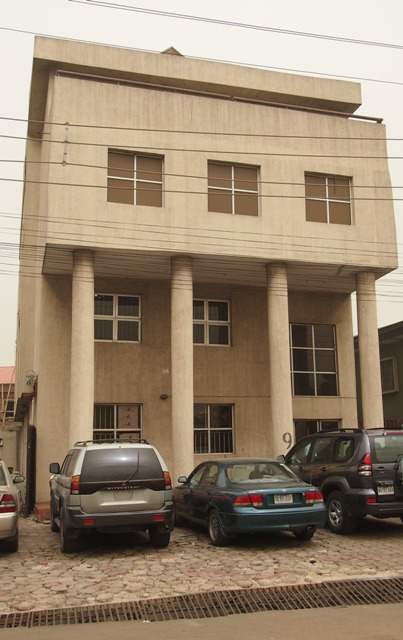
Center for Contemporary Art, Lagos. Photo by Richard McCoy.
*Ed. Note: This is the second post in a five-part series by Richard McCoy on the art and artists he encountered during a recent trip to Nigeria. Part I is here.
One of the most interesting places I visited in Lagos was the Center for Contemporary Art, Lagos (CCA) which was founded in 2007 by Bisi Silva, who remains the artistic director. When we visited, Bisi was away on travel but we were kindly met by CCA volunteer Jude Anogwih and CCA-staffer Taieye Idahor. Jude is a remarkable artist and curator, responsible for a number of projects in Lagos, co-founder of the Video Art Network in Lagos, and co-curator of the Tate Modern exhibition, Contested Terrains, which features four artists working in Africa; as part of this exhibition, he gave a lecture at the Tate Modern last march about the CCA (you can find a link to his lecture here).
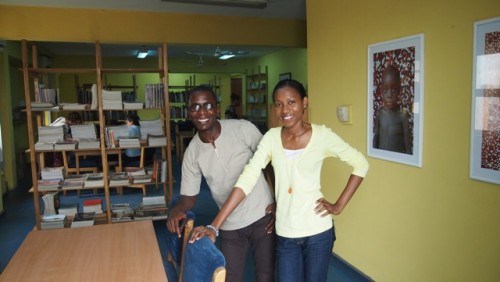
CCA volunteer Jude Anogwih and CCA staffer Taieye Idahor. Photo by Richard McCoy.
Since 2007, the CCA has become an important hub of activity for contemporary art in Lagos, hosting a number of critically-engaged exhibitions, public programs, as well as being home to the “largest library of contemporary art materials in all of West Africa,” according to Jude.

Some notable recent exhibitions include Identity: An Imagined State, which was the first international exhibition of video art in Nigeria. Complete with a small catalog, this exhibition featured the work of 12 artists all working on the continent of Africa.
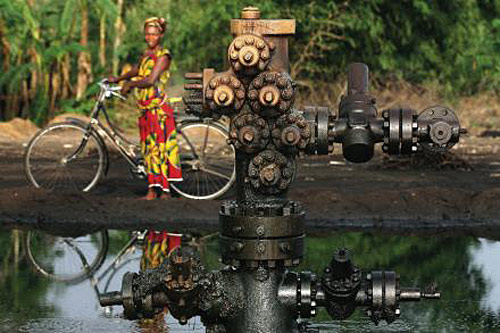
George Osodi, "Christmas Tree." Part of the "Oil Rich Niger Delta" series (2006).
In 2008, CCA hosted an exhibited of the work of Lagos-born photographer, George Osodi, who has spent a number of years documenting what is widely considered the most dangerous area of Nigeria: the Niger Delta, which is rich in oil deposits. He started this series in 2003 as a way to photographically document the people and places around the oil industry. In a 2008 interview with Bisi, Osodi talked what it was like to start working in this area:
Gaining access to the militants is all about risk taking, between life and death, as you really do not know what is going to happen in the creeks. My first encounter with the militants was during a visit to take pictures of oil installations. After 50 minutes driving in the creeks, a group of 7 men–two of them with guns–appeared out of nowhere and surrounded my boat.
Osodi was later released and has continued to document the people in this area despite the real danger he faces.
Most recently, the CCA has been a gathering place for folks engaged in the Occupy Nigeria movement, which grew out of protests related to the Nigerian government temporarily removing fuel subsidies. In response to the fuel subsidy crisis, Jude and Bisi organized an exhibition at CCA about Occupy Nigeria.
In the most recent CCA Newsletter, Bisi explains that this exhibition came about because of a change of plans; they previously had other plans for their exhibition space, but the fuel subsidy crisis made them change course.
Unsurprisingly these developments have adversely affected our programme, which was supposed to begin with the opening of the exhibition Contested Terrains co-organized by CCA and the Tate Modern, London. The project has suffered from a double dose of the “Naija Factor,” or from, as Fela Anikulapo-Kuti would sing, double wahala for everybodi. Even before the effects of the fuel crisis were felt, the corporate sponsors of the show informed us two weeks to the opening that they could not fund the project. Twenty-four hours after that “news” Occupy Nigeria made it impossible for us to guarantee the security or safety of the artworks or the artists and curators.
So instead of hosting Contested Terrains at the CCA, they invited a number of artists to install works and performances, including those by Kader Attia and Jelili Atiku. This exhibition was recently covered by the Huffington Post, with a number of excellent photos, and mentioned on e-flux.
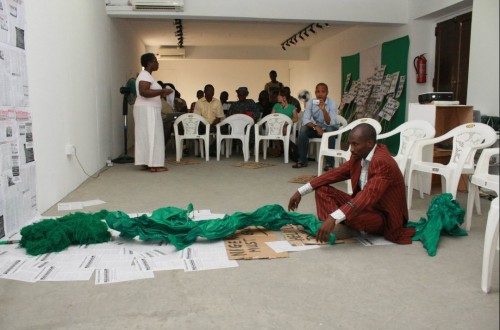
Performance by Jelili Atiku at the CCA exhibition "Occupy Nigeria." Photo courtesy CCA, Lagos.
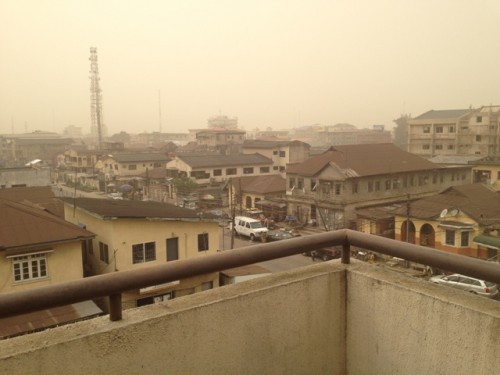
View from the porch at CCA, Lagos. Photo by Richard McCoy.




Pingback: No Preservatives | Looking Back to Nigeria: Ben Osaghae’s Critical Observations [Part III] | Art21 Blog